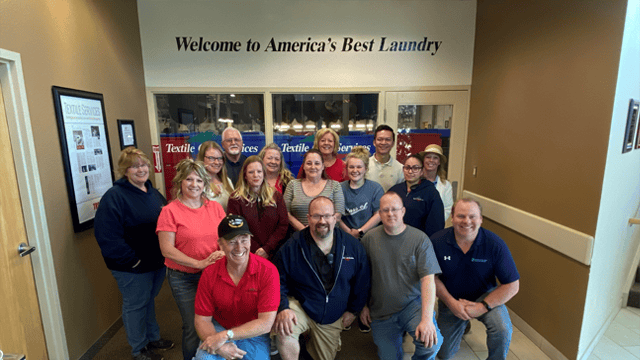Textile Care Services: A TRSA Plant of the Year

Mounted on a wall on the office of Paul Jewison, general manager of Textile Care Services (TCS), Rochester, MN, is a large wooden aircraft propeller that he earned for excellence in plant management from the Healthcare Laundry Services Group (HLSG), TCS’s corporate parent. Few who know Jewison would question that for 28 years he’s been the “propeller” that drives TCS – in terms of both leadership and innovation. Those qualities were critical in TRSA recognizing this facility as a “Plant of the Year’ in 2020. Below we preview a June article on TCS in Textile Services magazine.
As with other healthcare operators, early in the COVID-19 pandemic, throughput collapsed. Even the renowned Mayo Clinic, a key TCS customer, curtailed elective surgical procedures and other nonessential services as the number of COVID-19 cases exploded, starting in March 2020. Rochester-area hotels, about 15% of the plant’s throughput, also saw their business evaporate overnight. “That went down to almost nothing,” Jewison said, speaking of hotels, such as Hiltons and Marriotts that TCS services. Elsewhere the outlook was nearly as bleak. “Everything, yes; you name it,” he said. “Nursing homes were shutting down, closing their doors, deferred surgeries.” Overall volume dropped by 41% in the early weeks of the pandemic.
What to do? With a 96,000-square-foot (8,918-square-meter) plant, Jewison’s first thought was how to balance a sudden shortfall in demand with the need to keep TCS’s staff of 210 employees motivated and working at maximum efficiency, despite the fall in demand. It started with a focus on keeping his team intact. “I never laid people off,” Jewison said. “What I did is I decided I was going to shut the plant down on Wednesdays. Against all odds – people said it couldn’t be done – that’s what I did. Big plants like this, you got to have stuff flow. You’ve got to have work to do. They’re used to work and flow. When you go down to 60% of what you’re doing with a plant that produces 100%, you can’t manage it. It’s too hard. Supervisors don’t know enough on how to cut and manage that volume drop. So, I shut the whole plant down. Thursdays and Fridays were almost normal days. The soil would fill back up, and it looked normal.”
In a related step, Jewison adjusted employee hours to accommodate the shift in production flow. He’s so pleased with the results that some changes could extend beyond the pandemic. “Now we pretty much give it three or four hours before we start finishing,” he said. “We have enough bags in the system. When they all come in, instead of the cattle coming in slowly to the barn, they all come in at once, and we get milking.”
Equipment highlights include:
- TCS’s ETECH sorting system with its 61 soil chutes. Installed in 2006, the system has undergone multiple upgrades over the years, including the addition of a two-cart automated dumping system that helps speed up the process of emptying bags and moving goods up a conveyor belt to the sorting deck.
- No Plastic Bags: TCS’s solution to plastic waste is to substitute reusable bags.
- The plant’s three Senking (JENSEN) tunnels date to 1992-’93, but thanks in part to continuous upkeep they still perform at a high standard, Jewison said. Each tunnel has 16, 110 lb. (50 kg.) compartments. The tunnels are a major force in the plant’s weekly production of 600,000-plus lbs. per week (272,155 kg.) (It was 640,000 lbs. [290,299 kg.] pre-COVID).
- Ecolab provides the plant’s wash chemicals.
- Three 250 lb. washer/extractors from Pellerin Milnor Corp. and four 450 lb. Milnor washer/extractors. The entire plant runs on 0.26 gallons per lb.
- In addition to a bank of 14-plus Senking 220 lb. (100 kg.) dryers used to process goods from the tunnels, TCS has some vintage equipment, including a 28-year-old Challenge Dryer.
All production from sorting to the wash aisle and finishing is tracked automatically through an eVue software system from ETECH.
Moving to the finishing area, we see a KliQ feeder from JENSEN in a large processing area that includes six ironer lines. Several of the ironers are vintage American Laundry Machinery “Hypro” ironers.
Another finishing system we saw is a modified G.A. Braun Inc. small-piece folder that TCS uses to French fold pillowslips. Again, the machinery is several years old, but is highly effective.
Look for more on TCS in June’s Textile Services magazine. Click here to learn more about TRSA’s 2021 Plant of the Year Award or to apply for this recognition.
